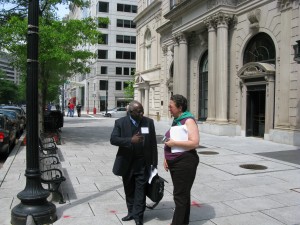May 2010
Government of the United States of America
Government of Japan
African Union Commission
Roundtable on Responsible Agricultural Investment (RAI)
Co-Chair’s Summary
The Government of the United States of America, the Government of Japan, and the African Union Commission hosted a Roundtable discussion on responsible agricultural investment (RAI) on April 25, 2010 in Washington, D.C., in close coordination with the Food and Agriculture Organization (FAO), the International Fund for Agricultural Development (IFAD), the UN Conference on Trade and Development (UNCTAD), and the World Bank. More than 130 invited representatives attended the Roundtable from developing and developed country governments, multilateral institutions, the private sector and civil society. The event was intended to broaden and deepen ongoing dialogue over seven proposed principles for responsible agricultural investment developed by FAO, IFAD, UNCTAD, and the World Bank. The following is a Co-Chair’s summary of the major points of discussion during the Roundtable.

1. Participants from all stakeholder groups welcomed the opportunity for broad consultation on the proposed RAI principles, recalling that leaders agreed at the November 2009 World Summit on Food Security in Rome to “continue studying principles and good practices to promote responsible international agriculture investment.” Attendees welcomed updates by the multilateral institutions on the work they are doing relevant to RAI principles, as agreed during a September 2009 Roundtable “Promoting Responsible International Investment in Agriculture” held on the margins of the UN General Assembly, and looked forward to the public release of a Knowledge Exchange Platform and research being done by the agencies on the scale, scope, and results of recent large-scale international investing in agriculture.
2. Speakers highlighted the importance of both domestic and international agricultural investment for increasing agricultural productivity, yields, and job creation in developing countries. Attendees recognized that official development assistance was insufficient to provide the full scale of agricultural investment required by developing countries, and that investment is a necessary contributor to the realization of nationally-defined food security goals.
3. Government representatives from both developing and developed countries described their own experiences with large-scale international agricultural investments, and shared insights into national planning and decision-making on this issue. In addition, speakers highlighted the need to support women in agriculture, practical means to achieve food security with the assistance of foreign direct investment and tools available from (and being developed by) various multilateral and other institutions.
4. Several private sector representatives discussed their experiences with large-scale international agricultural investments including issues related to corporate social responsibility and fostering open and transparent investment climates at national and local levels in host countries, in addition to the relevance of agro-investment principles. Other representatives from civil society and non-governmental groups encouraged additional transparency surrounding large-scale agro-investments, argued for stronger stewardship of land, water and other productive resources. They urged stronger oversight by national authorities into project formulation and execution including to protect small-holder farmers and vulnerable communities. Practical considerations raised included the need for open investment policies supported by strong rule of law, enhanced transparency, and respect for citizens’ rights.
5. In conclusion, participants agreed on the importance of an open and inclusive dialogue to continue encouraging responsible agricultural investment by various parties. Attendees discussed the utility of a commonly-accepted set of voluntary RAI principles, while acknowledging the complex challenges associated with their implementation. Participants noted the importance of consultation with governments and all relevant stakeholders as the World Bank, UNCTAD, FAO, and IFAD continue their work on this issue. Progress will be reviewed in the context of further consultations to be carried out in various multilateral fora, including the Committee on World Food Security, APEC, the World Economic Forum, and elsewhere. Looking ahead to next steps, participants identified the need to collect and absorb more information in order to assess how large-scale investments, especially state-sponsored or supported investments, can affect economic growth and job creation, can have an impact on livelihoods of local communities, farmers, and more broadly agricultural output and food security. Roundtable participants believed it would be useful for international organizations to continue assisting developing countries to analyze better potential agricultural investment proposals, and develop appropriate means to address investment in agriculture while applying open investment principles.
The Roundtable was attended by more than 130 representatives, including: 87 government officials; 10 private sector entities; and 34 multilateral and civil society organizations. Participants included several agriculture and finance ministers, the Director General of FAO, senior officials from the African Union Commission, the European Commission and the Governments of Australia, Bangladesh, Canada, China, Ethiopia, France, Germany, Guyana, Japan, Lesotho, Liberia, Mexico, Mozambique, Netherlands, Nigeria, Peru, Qatar, Republic of Korea, Russia, South Africa, Sudan, Spain, Switzerland, Tanzania, the United Kingdom, and the United States. Civil society representatives included senior attendees from The Atlantic Council, The Gates Foundation, International Food and Agricultural Trade Policy Council, International Land Coalition Secretariat, and SNV. Other senior participants attended from the African Development Bank, IDLO, OECD, Transparency International and UNIDROIT. Private sector representatives from Adecoagro, International Business Leaders Forum, Olam International, Mars Incorporated, Provident, Soyatech, World Perspectives and others participated in the Roundtable.













